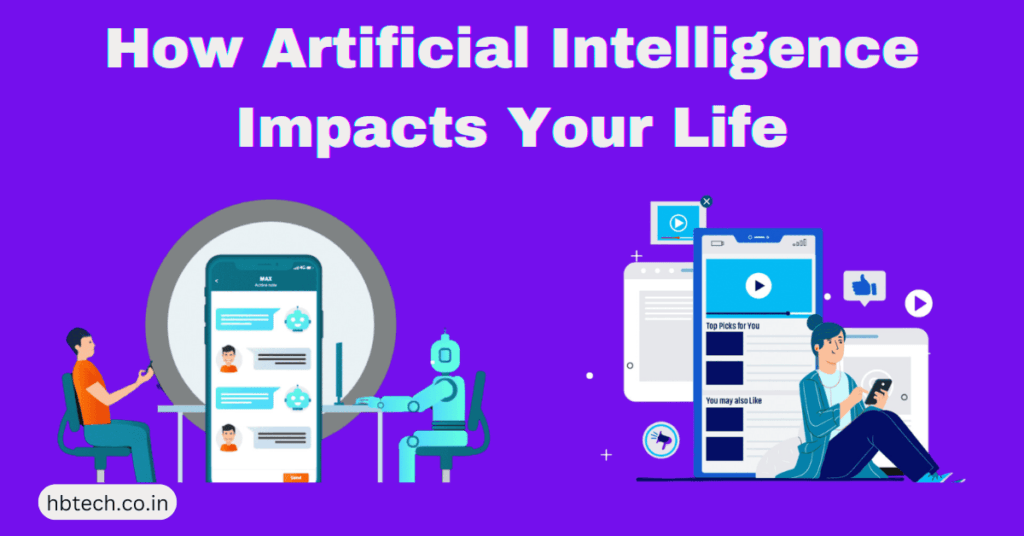Artificial Intelligence (AI) is now a part of everyday life, influencing how we learn, work and connect with the world. It’s making tasks easier, more efficient and often more personalized.
How Artificial Intelligence Helps Students
AI has changed the way students learn. Apps like Duolingo and Khan Academy use AI to create lessons that suit each student’s needs. Virtual tutors are available anytime to answer questions, give practice tests and offer feedback. Tools like Grammarly help with writing by fixing grammar and spelling errors.
AI also makes education more accessible. For example, text-to-speech software and transcription services help students with vision or hearing difficulties engage better with their studies.
How Artificial Intelligence Affects Daily Life
AI is everywhere in our daily routines. Voice assistants like Siri and Alexa help us set reminders, control smart home devices and search for information without lifting a finger.
In healthcare, AI is used to diagnose diseases faster and more accurately. Devices like smartwatches track health metrics such as heart rate and sleep patterns, even detecting early signs of medical issues.
How Artificial Intelligence Will Shape the Future
Looking ahead, AI promises even bigger changes. Self-driving cars could make transportation safer and more efficient. AI could also drive advances in renewable energy and medical breakthroughs, offering new treatments for diseases.
However, AI’s progress might bring challenges, like job automation. People may need to learn new skills to keep up with changing industries. Preparing for these changes will be important.
How Artificial Intelligence Impacts Life Today
AI is already a big part of modern life. Social media uses AI to show you posts and videos you’ll enjoy. Online stores suggest products based on what you’ve browsed and streaming services like Netflix and Spotify recommend shows and music based on your preferences.
Even small things, like unlocking your phone with facial recognition or using Google Maps for navigation, rely on AI. These tools make life easier and help you save time.
How Artificial Intelligence Influences Our Lives
AI works in the background in many areas. Banks use AI to detect fraud by analyzing transactions for unusual activity. I n workplaces, AI handles repetitive tasks so people can focus on creative and strategic work.
In farming, AI helps grow crops more efficiently by analyzing weather, soil and pest data. In entertainment, it powers lifelike animations, realistic video games and special effects in movies.
Impacts of Artificial Intelligence
AI affects different areas of life in several ways :
- Efficiency : AI speeds up tasks, reduces mistakes, and improves workflows.
- Personalization : It creates tailored experiences in education, shopping and entertainment.
- Accessibility : AI tools help people with disabilities access information and services.
- Healthcare : From diagnosing diseases to personalizing treatment, AI is transforming medicine.
- Ethical Issues : Privacy concerns, data misuse and bias in algorithms are challenges we need to address.
Role of Artificial Intelligence in Everyday Life
AI simplifies daily life in countless ways. From personalized shopping suggestions to smarter commuting routes, its presence is felt everywhere. Chatbots handle customer service inquiries and smart home gadgets like thermostats learn your preferences to make your home more comfortable.
Artificial intelligence is reshaping the way we live, work and interact. While it offers many benefits, it also comes with challenges that require thoughtful solutions. As AI continues to grow, its impact will only become greater, creating new possibilities and questions for the future.
Frequently Asked Questions(FAQs)
How is Artificial Intelligence helping students in their education?
AI enhances education by personalizing lessons through apps like Duolingo and Khan Academy. It provides virtual tutors available 24/7 to answer questions and offer feedback. Additionally, tools like Grammarly improve writing and accessibility features like text-to-speech software help students with disabilities engage better with their studies.
How does Artificial Intelligence make daily life easier?
AI simplifies daily tasks by powering voice assistants like Siri and Alexa, recommending products and content on shopping and streaming platforms and assisting with navigation through apps like Google Maps. It also improves health tracking with smartwatches and supports efficiency in tasks such as fraud detection and customer service.
What are the future impacts of Artificial Intelligence?
In the future, AI is expected to revolutionize transportation with self-driving cars, advance medical research for new treatments and improve renewable energy solutions. However, it may also bring challenges like job automation, requiring people to adapt to new skill demands.
Related Posts
- World Wide Technology: A Leader in Technology Solutions
- World of Monster Hunter: Games, Movies, and What’s Next
- Work-Life Balance: Simple Tips for a Happier, Healthier Life
- WhatsApp Banking : How to Check Bank Balance Through WhatsApp
- What’s app Privacy Policy : What’s App got angry || See what What’s App said…
- What Is Convergint Technologies? Everything You Need to Know









